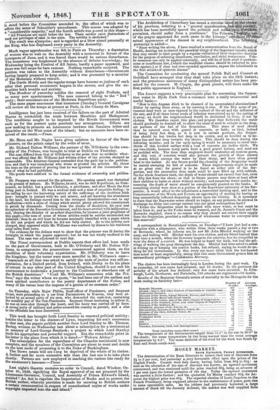Mr. Henn and Mr. Napier have given opinions in favour
of the State prisoners, on the points raised by the writs of error.
Mr. Richard Dalton Williams, the partner of Mr. O'Doherty in the own- ership of the Tribune, was brought to trial at Dublin on Thursday.
The case differed from that of O'Dolierty in the point that no evidence what- ever was offered that Mr. Williams had written either of the articles. charged as treasonable. The Attorney-General contended that the guilt lay in the publica- tion, and that it was immaterial who wrote or printed the articles. He threw the onus on the prisoner of proving that he was ignorant of the treasonable na- ture of what he had published.
The proofs were confined to the formal evidences of ownership and publica- tion.
Mr. Ferguson was counsel for the prisoner. His opening speech was rhetorical in its ground of defence. Mr. Williams, he said, was no Red Republican, no Com- munist, no Infidel, but a pious Christian, a gentleman, and after Moore the first living poet in Ireland. He was a medical man and a man of exquisite feeling: in his calling he saw the harrowing extent of the sufferings of the destitute Irish poor: brought in contact with wo and misery, and yet knowing the abundance in the land, his feelings moved him to the strongest dissatisfaction—not to say disaffection—with a state of things which amidst plenty allowed his countrymen to perish by thousands. Coming from the abodes of desolation, his eyes met the splendour of the Executive Government, and his heart swelled with indignation ; and, obeying the dictates of an ardent disposition, he became a joint proprietor of this paper,—the tone of some of whose articles could be neither extenuated nor defended: thus in an evil hoar he became nominally identified with a paper which he did not project and which he did not fully control. As to the articles now charged, they appeared while Mr. Williams was confined by illness to his residence some miles from town.
The evidence for the defence went to show that the prisoner was ill daring the fortnight in which the papers appeared; but he was not wholly confined to his house. The case was adjourned to next day.
The Times: correspondent at Dublin reports that offers had been made on the part of Government, both to Mr. O'Doherty and Mr. Dalton Wil- liams, to compromise the prosecutions commenced against them, on the condition of their voluntary expatriation. Mr. O'Doherty was to leave the kingdom; but the terms were more merciful in Mr. Williams's case- " inasmuch as all that was asked to satisfy the ends of justice was self-ex- patriation, for a limited period, from Ireland, with liberty to fix his place of retreat in any other part of the United Kingdom, should it not suit his convenience to undertake a journey to the Continent or elsewhere out of the British dominions." "Until Mr. Williams's connexion with the Tri- bune," says the writer whom we quote, "he had been one of the earliest and most spirited contributors to the poetry department of the Nation, and many of his verses bear the impress of a genius of no common order."
On Thursday, while Major Phibbs, Staff-officer of Pensioners, and Sergeant Grant, were proceeding on a car from Parsonstown to RISCrea, they were at- tacked by an armed party of six men, who demanded the cash-box, containing the monthly pay of the Out-Pensioners. Sergeant Grant hesitating to deliver it, he was at once shot through the heart, and the booty was carried off by force. : A strong-party of military and police scoured the country in pursuit, and a clue to the offenders has been discovered.
























 Previous page
Previous page